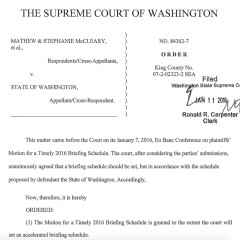It is now March of 2016, and all we have is a plan to make a plan.
Let’s look back at the timeline (Source).
It was January of 2007 when the state was first sued for not meeting its constitutional duty to adequately fund public schools.
In February of 2010, the King County Superior Court upheld the original ruling, in favor of McCleary et al.
January 2012, and the State Supreme Court upheld the King County Superior Court’s ruling.
In December of 2012, the state’s report to the court was deemed inadequate: the state was failing to fulfill the conditions of the ruling.
In January of 2014, a deadline of April 2014 was given for the Legislature to develop and provide a plan for how the state would fully fund basic education, as required by the state constitution. This deadline wasn’t met, and the state was found in contempt in September of 2014…but the court delays levying sanctions until after the 2015 session.
April 2015: Lawmakers entered a special session for budget negotiations, so the court granted and extension from sanctions.
Finally, in August of 2015, the court levied the sanction of a $100,000-a-day fine against the Legislature. (I still don’t fully understand this… who is paying the $100,000-a-day fine, and to whom?)
Back in November of 2015, McCleary et al. filed a motion calling out the failure of the $100,000 sanction to motivate lawmakers to action, and went so far as to request more substantial sanctions potentially including the suspension of all State tax exemption statutes until the state’s K-12 schools are fully funded (with the rationale that “paramount duty” to fund schools trumps a tax break for industry), or the invalidation of any unfunded state statute to which K-12 schools are held (Source). Ultimately, the Court did not go that far, but instead agreed to an accelerated briefing schedule (Source).
Now, it is March of 2016, and all we have is a plan to make a plan.
On one hand some might celebrate (as Governor Inslee seemed to) that this marks tremendous forward movement. On the other hand, the reality is pretty clear from the pattern of evidence detailed above: Despite the lip-service offered about the importance of education, it is simply not a priority for our lawmakers, and the Supreme Court’s sanctions simply do not motivate meaningful action (as McCleary et al.’s November motion unequivocally states). How much longer will the Legislature be permitted to defer the real, hard work of funding education into the future? When the 2017-18 deadline for full funding finally arrives, what evidence is there to suggest that failure to meet that deadline will have bring with it any consequence?

The state court has other tools besides the contempt fines, if it chooses to use them. Last fall I heard the plaintiffs’ attorney, Thomas Ahearne, explain several options the court has. The court can prohibit the legislature from spending money on certain other matters until the legislature complies with the court’s ruling. They can order the legislature to pass legislation funding specific amounts or remedies. They can order the legislature to sell state property in order to fund constitutional compliance. The court can invalidate education funding cuts in the budget. They can prohibit any funding of an unconstitutional education system. In fact, they can order any appropriate relief.
On the other side, I wonder if some legislators are dragging their heels, hoping enough justices will die or retire before the sanctions become too onerous. Then they can hope to get McCleary overturned.
Or I wonder how many legislators are contemplating a constitutional amendment to remove the line saying it is “the paramount duty” of the state to make ample provision for the education of all children residing within its borders. I’ve actually heard that floated as a “solution.”
Remember, the 2017 session is the next long session when budgets are written. The 2018 session will be a short session. Throughout this entire process, every time we’ve had a short session, legislators have argued that it was the wrong time to make dramatic changes to the budget, and that it should wait for the next long session.
All the information the legislature is now trying to collect will have to be collected and analyzed between July of 2016 and December of 2017 for there to be any hope of them being able to act on it during the session that will begin in January 2017. Since this legislation has been passed mid-way through the school year, I don’t even know what percentage of districts might be prepared to report what the legislature claims now to need. Having waited on OSPI to collect and report information from districts repeatedly over the years, I’m not holding my breath. That there’s an election during that time will, of course, be one more problem with developing a plan from the plan.
And all of that ignores that pesky little problem of districts needing to know what they’ll be getting from the state in order to plan their own budgets. Imagine a 2017 session ending some time the 2015 one did — in June. How exactly is a district to write a 2017 – 2018 budget beginning in June of 2017?
Pingback: If McCleary Doesn’t Motivate the Legislature, What… | EducatorAl's Tweets